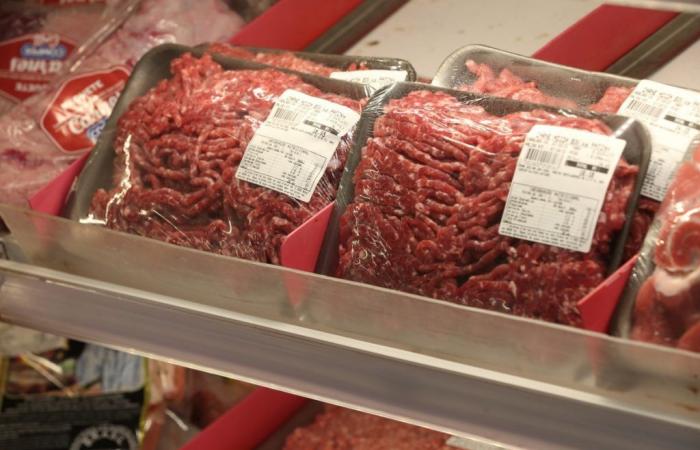Shopping list, cart, and… calculator. This is what the routine of Rio Branco residents tends to be like when they go for basic day-to-day shopping. And according to a study by the Tutorial Education Program (PET) of the economics course at the Federal University of Acre (Ufac), the calculations had slightly less satisfactory results with regard to meat in the capital of Acre.
This because 7 of 12 cuts searched there was an increase in the capital of Acre in the period between March 8th and 12th. The survey monitored the prices of 55 commercial establishments in Rio Brancoand also showed that prime cuts, such as picanha and fillet, which are more expensive, are among those that saw a reduction compared to the same period in the previous month.
Marcos Vinicius de Oliveira, one of the program’s fellows and who participated in the study, highlights that the objective is to help the public find alternatives to save on purchases. Oliveira explains that the study is monthly, and that it will continue throughout 2024.
“The study arises from the desire to show the population that there was a difference between the price of meat in supermarkets and in butchers. With this, in a certain way, we intend to help the population to save money. The survey is carried out monthly, in the second week of the month, in 50 establishments, 3 of which are the city’s main supermarkets and the other 47 are butchers”, he explains.
Variation in meat prices in Rio Branco
| Cut | Variation in % |
| Rump steak | -3.20 |
| soft thigh | 2.82 |
| Diaper | -1.97 |
| Shovel with bone | -0.76 |
| Rump | -0.01 |
| Needle | 3.69 |
| Muscle | 3.83 |
| Filet | -4.20 |
| Hard thigh | 3.55 |
| Liver | 3.05 |
| Boneless shovel | 0.89 |
| Duckling | 3.57 |
According to the study, the lowest price identified in establishments it was R$3.99 charged in two stores for 1 kg of liver. The highest price found in the period was R$ 78.99 per 1 kg of picanha, also in two establishments.
Based on average prices, the study also showed that prices are lower in butchers compared to supermarkets. Most of the rates that the study found were lower in establishments specializing in the meat trade.
“This month, we had a drop in two cuts of meat, and an increase in the others, which are most consumed by the general population. In the months that we have been carrying out the research, we have not yet been able to draw key conclusions about how the price of meat varies, and which factors are driving this issue. Furthermore, our research, for now, only seeks to show whether or not there is variation and what the value is, requiring it to mature for more months so that we can observe and analyze factors”, he adds.
The Broad National Consumer Price Index (IPCA), an indicator that is considered official inflation, it was 0.26% in February in the capital of Acre, lower than the percentage in January, which registered 0.63%. This is the lowest result among the Brazilian capitals studied in the previous month. The data are from the Brazilian Institute of Geography and Statistics (IBGE) and were released this Tuesday (12).
Unlike the month of January, which was driven by the housing sector, in February the drop in inflation had as its preponderant factor the 19.37% drop in air ticket prices.
In the transport sector, IBGE highlights that the 1.91% variation in urban buses was influenced by the adjustment in Vitória (ES), in São Paulo (SP), and in the capital of Acre, of 3.55%, after application of free on the 17th, 24th and 31st of December.
Public transport will be free in Rio Branco on the last two Sundays of 2023
With the result achieved in the second month of 2024, the state recorded a drop of 0.37% compared to January. In the last 12 months, the index was 4.39% and based on the first two, the percentage was 0.89% this year.
The IPCA has been calculated by IBGE since 1980, refers to families with a monetary income of one to 40 minimum wages, whatever the source, and covers ten metropolitan regions of the country, in addition to the municipalities of Goiânia, Campo Grande, Rio Branco, São Luís, Aracaju and Brasília.
In national terms, seven of the nine products and services surveyed increased in February. The biggest change (4.98%) and the biggest impact (0.29%) came from Education. Other highlights were the Food and beverages (0.95% and 0.20%) and Transport (0.72% and 0.15%) groups. Overall, the index was 0.84% in the country.
See the results of the IPCA groups:
- Food and drinks: 0.95%;
- Housing: 0.27%;
- Household items: -0.07%;
- Clothing: -0.44%;
- Transport: 0.72%;
- Health and personal care: 0.65%;
- Personal expenses: 0.05%;
- Education: 4.98%;
- Communication: 1.56%.






